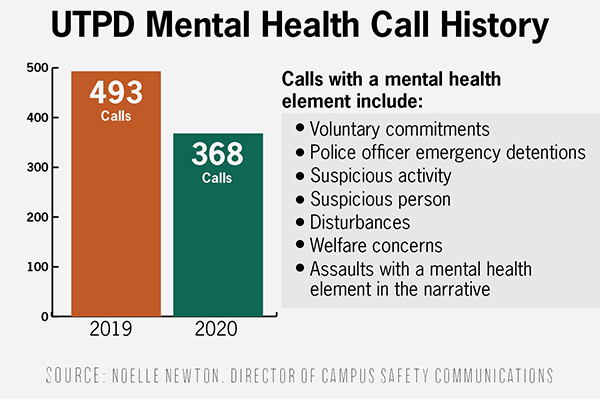Mental Health Assistance and Response Team to join UTPD on mental health crisis calls
September 8, 2021
A team of trained counselors will now accompany University of Texas Police Department officers on mental health calls. However, some students fear the presence of police will still hinder students from calling for help during a crisis.
The University received input from various student organizations on the creation of the Mental Health Assistance and Response Team such as the Senate of College Councils, who released a letter of demands in June 2020 calling for divestment from UTPD and reallocation of those funds towards mental health services.
Marla Craig, associate director for clinical services at the Counseling and Mental Health Center, said MHART currently has two licensed mental health providers on site to assist officers but will continue to grow depending on the frequency and volume of calls. The team is part of a two-year pilot program that will hopefully be expanded in the future, Craig said.
Craig said MHART formed because of campuswide conversations to improve responses to mental health calls that come to UTPD and to create a less intimidating approach to mental health calls.
“My hope is that this will definitely help build some more positive relationships with law enforcement,” Craig said. “Having our mental health providers there as well I think also helps with de-escalating the situation and providing a different approach.”
Noelle Newton, UTPD director of campus safety communications, said UTPD estimated that they responded to 493 calls involving a mental health related issue in 2019 and 368 in 2020.
UTPD officers accompanying MHART are part of the University Crisis Intervention Team that has been active since January 2021 and have undergone training to deal with mental health crisis calls, UTPD Captain Laura Davis said.
Davis said a majority of mental health related calls they receive involve people who are in crisis. Davis said MHART operates from 9 a.m to 6 p.m. because that is when UTPD receives the most mental health crisis calls.
“(UCIT is) there to make sure that if they do feel like they’re going to hurt themselves, we get them that immediate care, and if they need continuing care, get them over to the resources that are available here on campus,” Davis said.
Karina Peña, a Latin American studies senior, said students might not utilize the program because of the negative stigma associated with police, especially for students of color.
“For a lot of Latino or Hispanic students in Texas, with our border relations, a lot of immigrants have never really had good interactions with police,” Peña said. “Whether it be that they take them to get deported or separate them from their families, or incriminate them, there is always that added fear.”
Davis said UCIT wears low profile uniforms that do not look like typical police uniforms in an attempt to reduce anxiety among students.
“The main thing that the police officers are there to do is to make sure the scene is safe, that there’s no chance of any violence, and then allow their counselors to go ahead and work with them,” Davis said.
Peña said it might be hard to cast aside the fear that is embedded in students of color but that MHART could potentially improve community relations with police.
“I think it’s a step in the right direction,” Peña said. “To have a good experience with this new program would be helpful in making (students of color) feel more safe and valid in the UT community.”












